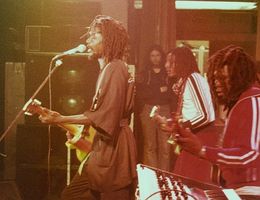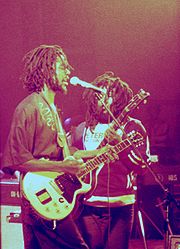Peter Tosh
| Peter Tosh | |
|---|---|
 Peter Tosh (left) on the Bush Doctor tour, 1978 |
|
| Background information | |
| Birth name | Winston Hubert McIntosh |
| Also known as | Stepping Razor |
| Born | 19 October 1944 |
| Origin | Westmoreland, Jamaica |
| Died | 11 September 1987 (aged 42) |
| Genres | reggae, ska, rocksteady, R&B |
| Occupations | singer, musician, revolutionary |
| Instruments | piano, guitar, organ, vocals, keyboard |
| Labels | Intel-Diplo |
| Associated acts |
The Wailers Bob Marley |
| Notable instruments | |
| Gibson Les Paul Junior | |
Peter Tosh, born Winston Hubert McIntosh (19 October[1] 1944 – 11 September 1987) was a reggae musician who was a core member of The Wailers who then went on to have a successful solo career as well as being a trailblazer for the Rastafari movement.
Peter Tosh was born in Petersfield, Jamaica with a father and mother too young to take care of him. He grew up raised by his aunt, speaking out for those who could not fight for themselves. Nicknamed 'Stepping Razor', he began to sing and learn guitar at a early age inspired by the American stations. After an illustrious career with The Wailers and as a solo musician, he was murdered at his home during a robbery.
Contents |
With The Wailers
In the early 1960s Tosh met Bob Marley and Bunny Wailer through his vocal teacher, Joe Higgs. While perfecting their sound, the trio would often play together on street corners in a Jamaican slum called Trenchtown. Joe Higgs was the man who taught the trio to harmonize. In 1962, he was the driving force behind the formation of The Wailing Wailers with Junior Braithwaite and backup singers Beverley Kelso and Cherry Smith. The Wailing Wailers had a huge ska hit with their first single, "Simmer Down", and recorded several more successful singles before Braithwaite, Kelso and Smith left the band in late 1965. Marley spent much of 1966 in Delaware in the United States of America with his mother, Cedella (Malcolm) Marley-Booker and for a short time was working at a nearby Chrysler factory. He then returned to Jamaica in early 1967 with a renewed interest in music and a new spirituality. McIntosh and Bunny were already Rastafarians when Marley returned from the U.S., and the three became heavily involved in the Rastafari movement. Soon afterwards, they renamed the group The Wailers. Tosh would later explain that they chose the name Wailers because to "wail" means to mourn or to, as he put it, "...express ones feelings vocally".
Veering away from the up-tempo dance of ska, the band slowed down to a rocksteady pace, and infused their lyrics with political and social messages. The Wailers penned several songs for the American born singer Johnny Nash before teaming up with production wizard Lee Perry to record some of reggae's earliest hits including "Soul Rebel", "Duppy Conqueror", and "Small Axe". With the addition of bassist Aston "Family Man" Barrett and his brother, drummer Carlton in 1970, The Wailers became Caribbean superstars. The band signed a recording contract with Chris Blackwell and Island Records and released their debut, Catch a Fire, in 1973, following it up with Burnin' the same year.
In 1973, Tosh was driving home with his girlfriend Evonne when his car was hit by another car driving on the wrong side of the road. The accident killed Evonne and severely fractured Tosh's skull. He survived, but became harder to deal with. After Island Records president Chris Blackwell refused to issue his solo album in 1974, the volatile Tosh and Bunny Wailer left the Wailers, citing the unfair treatment they received from Blackwell, to whom Tosh often referred with the derogatory play on Blackwell's surname, 'Whiteworst'.
Solo career
Tosh began recording under the name Peter Tosh, and released his solo debut, Legalize It, in 1976 on CBS Records. The title track soon became an anthem for supporters of marijuana legalization, Reggae lovers and Rastafarians all over the world, and was a favourite at Tosh's concerts. As Marley preached his "One Love" message, Tosh railed against the hypocritical "shitstem", and became a favourite target of the Jamaican police. He proudly wore the scars that he had received from the beatings he endured. Always taking the militant approach, he released Equal Rights in 1977.
Tosh put together a backing band, Word, Sound and Power, who were to accompany him on tour for the next few years, and many of whom appeared on his albums of this period. In 1978 Rolling Stones Records signed Tosh, and the album Bush Doctor was released, introducing Tosh to a larger audience. The single from the album, a cover of The Temptations song Don't Look Back, performed as a duet with Rolling Stones singer Mick Jagger, turned Tosh into one of the best known reggae artists. This was a far cry from his start, playing with Bunny and Bob on the streetcorners of Trenchtown, Kingston, Jamaica. Tosh, as the original guitarist for The Wailers', is considered as one of the originators of the choppy and syncopated reggae guitar style.

In the free One Love Peace Concert in 1978, Tosh lit a spliff and gave a lecture about legalizing cannabis, lambasting attending dignitaries Michael Manley and Edward Seaga for their failure to pass such legislation. Several months later he was stopped by police as he left Skateland dance hall in Kingston and was severely beaten while in police custody.
Mystic Man (1979), and Wanted Dread and Alive (1981) followed. Released on the Rolling Stones' own record label, Tosh tried to gain some mainstream success while keeping his militant views, but was largely unsuccessful, especially compared to Marley's achievements. That same year, Tosh appeared in the Stones' video, Waiting on a Friend.
After the release of 1983's Mama Africa, Tosh went into self-imposed exile, seeking the spiritual advice of traditional medicine men in Africa, and trying to free himself from recording agreements that distributed his records in South Africa.
Tosh also participated in the international opposition to South African apartheid by appearing at Anti-Apartheid concerts and by reflecting his stance in various songs like "Apartheid" (1977, re-recorded 1987), "Equal Rights" (1977), "Fight On" (1979), and "Not Gonna Give It Up" (1983). In 1991 Stepping Razor - Red X was released, a film - documentary by Nicholas Campbell and produced by Wayne Jobson and based upon a series of spoken-word recordings of Tosh himself, which chronicled the story of the artist's life, music and untimely death.
Religion
Along with Bob Marley in the late 1960s, Peter Tosh became an adherent of the religion known as Rastafari.[2] As genuine Rastas refrain from consuming meat, which is known as Ital, it worked for Tosh since he was already a vegetarian.[3]
Death
In 1987, Tosh appeared to be on the way to a career revival. He was awarded a Grammy for Best Reggae Performance in 1987 for No Nuclear War. On 11 September 1987, just after Tosh had returned to his home in Jamaica, a three-man gang came to his house demanding money. Tosh replied that he did not have any with him but the gang did not believe him. They stayed at his residence for several hours in an attempt to extort money from Tosh. During this time, many of Tosh's friends came to his house to greet him following his return to Jamaica. As people began to arrive, the gunmen became more and more frustrated, especially the leader of the gang, Dennis 'Leppo' Lobban, a man whom Tosh had befriended and tried to help find work after a long jail sentence. Tosh said he had no money in the house, after which the gang's leader put a gun to Tosh's head and fired twice, killing him. The other gunmen began shooting, wounding several others and also killing disc jockey Jeff "Free I" Dixon. Leppo turned himself over to the authorities. He was sentenced to death, but his sentence was commuted in 1995 and he remains in prison.[4]
Unicycling
At some point after his departure from the Wailers, Tosh developed an interest in unicycles and knitting, he became an accomplished rider, being able to ride forwards and backwards and hop. He often amused his audiences by riding onto the stage on his unicycle for his shows.[5][6] .
Discography
As The Wailers
- The Wailing Wailers (1965)
- Soul Rebels (1970)
- Soul Revolution (1971)
- Soul Revolution Part II (1971)
- The Best of The Wailers (1972)
- Catch a Fire (1973)
- Burnin' (1974)
- Rasta Revolution (1974)
Studio albums
- Legalize It (1975)
- Equal Rights (1977)
- Bush Doctor (1978)
- Mystic Man (1979)
- Wanted Dread And Alive (1981)
- Mama Africa (1983)
- No Nuclear War (1987)
Live albums
- Captured Live (1984)
- Live at the One Love Peace Concert (2000)
- Live & Dangerous: Boston 1976 (2001)
- Live At The Jamaica World Music Festival 1982 (2002)
- Complete Captured Live (2004)
Compilations
Listed are compilations containing material previously unreleased outside of Jamaica.
- Honorary Citizen (1997)
- Scrolls Of The Prophet: The Best of Peter Tosh (1999)
- I Am That I Am (2001)
- The Best Of Peter Tosh 1978-1987 (2003)
- Talking Revolution (2005)
- The Ultimate Peter Tosh Experience (2009)
Appears on
- Negril (Eric Gale, 1975)
- Blackheart Man (Bunny Wailer, 1976)
- Protest, (Bunny Wailer, 1977)
See also
- Bob Marley
- Bob Marley and the Wailers
- List of Rastafarians
- List of reggae musicians
- List of vegetarians
- Reggae
References
- ↑ Liner notes to album Burnin'
- ↑ [1]
- ↑ [2]
- ↑ Ivan impacts on celebrations for Peter Tosh - JAMAICAOBSERVER.COM
- ↑ Babylon by Bike.
- ↑ Johnny B. Goode video.
External links
- Peter Tosh on Allmusic
- Discography
- Peter Tosh - Jamaicapage.com Feature
- The Wailers News
- VitalSpot - Peter Tosh
|
|||||||||||||||||||||||||||||||||||||